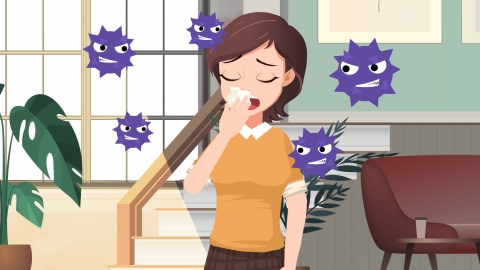How to deal with nasal congestion
In general, nasal congestion refers to a blocked nose. Nasal blockage may be caused by environmental irritants, body position factors, acute rhinitis, allergic rhinitis, sinusitis, and other reasons. It is recommended to seek timely medical advice and adopt general treatments, medication, and other methods under a doctor's guidance. A detailed explanation is as follows:

1. Environmental Irritants
When staying in cold, dry, or heavily air-polluted environments, the nasal mucosa may become irritated. To resist these adverse stimuli, the nasal mucosa may become congested and swollen, leading to nasal blockage. It is recommended to avoid prolonged exposure to harsh environments, wear masks in cold weather, use humidifiers to increase indoor air humidity, and minimize outdoor activities on hazy days.
2. Body Position Factors
When lying on one side for a prolonged period, the nasal cavity on the lower side may experience slower blood return due to gravity, making it prone to congestion and possibly causing nasal blockage. Try to avoid maintaining the same lateral position for long periods. Change positions regularly during sleep and appropriately elevate the head to promote blood circulation.
3. Acute Rhinitis
Acute rhinitis is usually caused by viral infections, such as rhinovirus or coronavirus. After the virus invades the nasal mucosa, it may trigger an immune response, leading to nasal mucosal congestion, edema, and increased secretions, resulting in nasal blockage. Symptoms may also include sneezing and fever. Under a doctor's guidance, medications such as Qianbo Rhinitis Tablets,赛洛唑啉 nasal spray (Xailuozuolin), Loratadine Tablets, and others may be used for treatment.
4. Allergic Rhinitis
Allergic rhinitis occurs when the body comes into contact with allergens such as pollen, dust mites, or animal fur, triggering an overreaction of the immune system. This reaction releases inflammatory mediators like histamine, causing nasal mucosal congestion and swelling, which leads to the above symptoms. Additional symptoms may include nasal itching and paroxysmal sneezing. Patients may follow medical advice to use medications such as Budesonide nasal spray, Cetirizine hydrochloride drops, Montelukast sodium chewable tablets, and others for treatment.
5. Sinusitis
Sinusitis is often caused by bacterial infection, commonly occurring when sinus drainage is impaired, such as due to a deviated nasal septum or nasal polyps blocking the sinus openings, allowing bacteria to multiply within the sinuses and cause inflammation. The inflammatory stimulation leads to congestion and swelling of the sinus mucosa, increased secretions, and nasal blockage. Additional symptoms may include headache and reduced sense of smell. Patients may follow medical advice to use medications such as Amoxicillin and Clavulanate Potassium Tablets, Paracetamol Tablets, Amoxicillin Capsules, and others for treatment.
In daily life, it is important to engage in regular exercise to strengthen physical health and improve resistance. Maintain nasal hygiene, avoid frequently picking the nose with hands, and prevent damaging the nasal mucosa, which could lead to infection.









